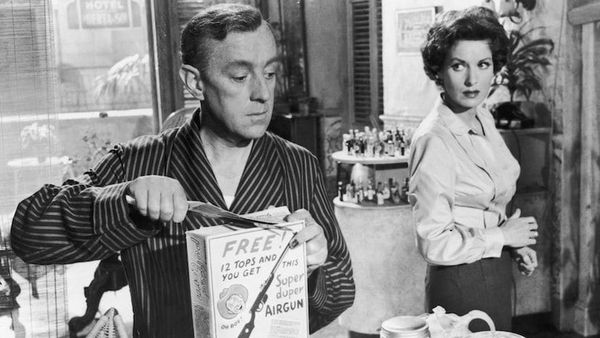Eye For Film >> Movies >> Our Man In Havana (1959) Film Review
Our Man In Havana
Reviewed by: Jeff Robson

When a writer/director partnership produces one of the all-time classics of cinema, it’s hard not to regard their other collaborations with a sense of disappointment.
Carol Reed and Graham Greene certainly did just that with The Third Man, a near-perfect combination of complex character study, atmospheric evocation of time and place and edge-of-the-seat thriller. But Our Man in Havana, beautifully restored for this year’s London Film Festival, is an intriguing companion piece.

And while never quite scaling the heights of their all-time great, it’s still a richly rewarding film which, while undoubtedly lighter in tone, shares many of the same themes and has the same literate worldliness – a desire to treat its readers like adults and not hammer its message home that’s all too rare in cinema these days. And like The Third Man, it looks simply stunning.
Once again the focus is on exiles in a strange and dangerous world – in this case the expat community in the pre-revolutionary Cuba of the late Fifties. The majestic opening sequence, where Oswald Morris’ superb black-and-white cinematography tracks from the opulence of a rooftop pool to the hustle (in every sense) and bustle of the teeming backstreets, firmly establishes an atmosphere of sunlit but flyblown temptation.
Classic Graham Greene territory, then. And the protagonist is a classic Greene anti-hero. Wormold (Alec Guinness) is the Havana representative of a vacuum cleaner company. Exiled by circumstance and world-weary by temperament he lives a life of transplanted genteel poverty. All he cares about is his teenage daughter Milly (Jo Morrow), whom he’s raising as a devout Catholic to fulfil a pledge to the wife who abandoned him, and his friend Dr Hasselbacher (Burl Ives), with whom he shares cynical remarks and morning daiquiris.
This routine is disrupted by one of the great movie entrances – Noel Coward, dressed head to toe in black, oblivious to the blazing sunshine and the mariachi buskers pressing themselves on him. He’s Hawthorne, the head of Caribbean operations for MI6. They need a man in Havana and Wormold’s been chosen for the honour.
His recruitment scene is a masterclass in physical and verbal comedy and sets the tone for the film. Wormold has no experience or qualifications but seems “the right sort of chap”. He regards it all as a ridiculous joke but realises the money will be useful to fund Milly’s spending habits – and give him an entrée to the higher reaches of Cuban society.
He sets about establishing a network of bogus sub-agents taken from the membership list of the Havana country club, diligently sending reports of their activities back to London, along with sketches for ‘secret weapons’ based on the parts from his vacuum cleaners. The Chief (Ralph Richardson) is so impressed he sends Beatrice (O’Hara) out to work as Wormold’s secretary, as well as a radio operator and all the apparatus of a busy MI6 station. Wormold finds his work increasingly cut out as he tries to maintain the pretence – not helped by the fact that he falls in love with the clever and practical Beatrice.
And inevitably, the realities of the Cold War begin to intrude on his whimsical money-earner. MI6 aren’t the only ones who think the bogus network is genuine. When his ‘agents’ start to meet mysterious but gruesome ends Captain Segura (Ernie Kovacs), the local police chief and one of Milly’s admirers, starts to put the pressure on. Wormold belatedly realises just what sort of country he’s living in – and that the people he loves are in real danger… As the action builds to a climax Reed orchestrates the tension with his customary skill. You’ll find yourself sharing Wormold’s growing suspicions of those closest to him. And wondering not only if he’ll escape alive but what the realities of a deadly game like espionage will force him to do.
But Reed, and Greene, pull off the tricky balancing act of combining all of this with a delicious air of black comedy. The innate absurdity of the secret agent’s life, with all its paranoia and double standards, has rarely been so elegantly and mercilessly skewered. One sight gag between Coward and Guinness will, I guarantee, have you laughing out loud for several minutes. And the London scenes, where Hawthorne, the Chief and various ministry high-ups earnestly discuss Wormold’s ludicrous ‘revelations’, will be an eye-opener to anyone who thinks taking the you-know-what out of the Establishment began with David Frost and Monty Python.
But Havana is the real heart of the film, and almost a character in itself. Shot just a few months after the revolution, with the full co-operation of a new government happy to see the Batista regime depicted (entirely accurately) as a corrupt police state, Morris’ camerawork revels in the fading elegance of the old Spanish city and the tawdry would-be glamour of its nocturnal underworld. This isn’t the high-end debauchery depicted by Coppola in The Godfather Part 2 but a cheap and sordid (yet equally nasty) peddling of vice and exploitation that the government’s happy to use as the mainspring for its economy.
Wormold’s education in the brutal truths of this world, and his efforts to find something better in it, have a tragicomic grandeur to them. It was the kind of role Guinness excelled in and he’s rarely been better. At equal turns ridiculous, cowardly, cunning and brave, Wormold’s Everyman is a close relative of ‘Dutch’ Holland, Guinness’ bank clerk turned criminal in The Lavender Hill Mob – and perhaps even an ancestor of George Smiley, the masterspy whose incarnation in the TV version of Tinker Tailor Soldier Spy crowned a great actor’s glittering career.
He’s well supported by the glorious double act of Coward and Richardson. And Maureen O’Hara’s turn (English accent and demure manner perfectly in place) will be a revelation to those who, like me until now, thought her cinematic career consisted mainly of giving John Wayne a piece of her mind.
In fact, the only real weak link is Ives. A great screen presence in the right role (though even playing glowering patriarchs, I was always convinced he’d start singing about ladybirds any minute) he never really convinces as a worn-down, lonely exile. And his accent rarely gets any closer to Munich than Minnesota. His performance is an intriguing contrast to that of Kovacs, a New Joisey-born stand-up and TV comedian of Hungarian descent who’s utterly convincing, delivering an air of genuine menace and some of the film’s best lines, as the brutal but outwardly respectable and pious police chief, symbol of everything that was rotten in pre-Castro Cuba.
A witty ‘entertainment’ (as Greene described the somewhat darker novel on which the film is based), a beautiful but barbed travelogue and a Cold War drama whose dry cynicism anticipated the ‘plague on both their houses’ attitude of Le Carre and others (The Tailor of Panama, in both book and film incarnations, owes it an undoubted debt) Our Man in Havana mixes all its ingredients into a near-perfect cocktail. Sit down, enjoy it and raise your glass to one of the great cinematic storytelling double-acts.
Reviewed on: 16 Oct 2015
















